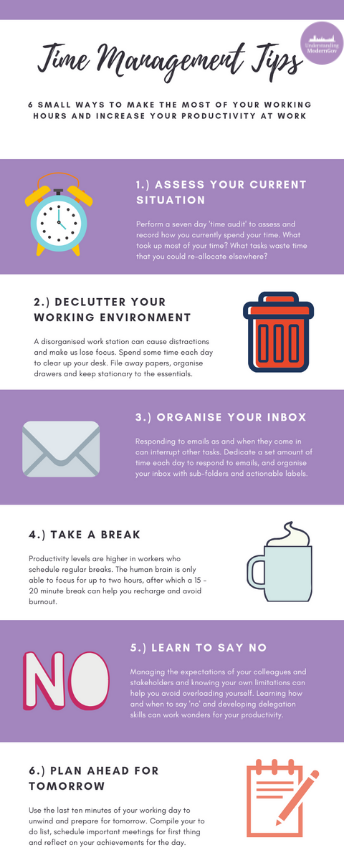Top Six Time Management Tips for a More Productive Working Week
 Chloe Martin
·
2 minute read
Chloe Martin
·
2 minute read
Time. It’s the most precious resource we have, yet it’s often our greatest barrier to success.
Most of us think we simply don’t have enough of it, many of us are stressed out by the constraints it poses on us and some of us waste too much of it by clock-watching and wishing it away.
Why is Time Management Important?
The simple fact is that no matter how rich, successful or important you are, our lives are all measured out in the same units of time – hours, days, weeks, months – the list goes on. How many times have you thought to yourself, ‘There’s not enough hours in the day’, or ‘I can’t wait for this week to be over’? Feeling overwhelmed by your workload can lead to procrastination, a lack of engagement and increased stress at work.
By making small changes to your daily schedule and developing the skills for effective time management, you can increase your productivity, successfully manage multiple projects and deadlines and avoid burnout.
Six Time Management Tips to Make the Most of Your Working Time
1. Assess your current situation
Perform a seven-day 'time audit' to assess and record how you currently spend your time. What took up most of your time? What tasks waste time that you could re-allocate elsewhere?
2. Declutter your working environment
A disorganised workstation can cause distractions and make us lose focus. Spend time each day to clear up your desk. File away papers, organise drawers and keep stationary to the essentials.
3. Organise your inbox
Responding to emails as and when they come in can interrupt other tasks. Dedicate a set amount of time each day to respond to emails and organise your inbox with sub-folders and actionable labels.
4. Take a break
Productivity levels are higher in workers who schedule regular breaks. The human brain is only able to focus for up to two hours, after which a 15-20 minute break can help you recharge and avoid burnout.
5. Learn to say no
Managing the expectations of your colleagues and stakeholders and knowing your own limitations can help you avoid overloading yourself. Learning how and when to say 'no' and developing delegation skills can work wonders for your productivity.
6. Plan ahead for tomorrow
Use the last ten minutes of your working day to unwind and prepare for tomorrow. Compile your to-do list, schedule important meetings for first thing and reflect on your achievements for the day.
Feel free to share this graphic below to help other professionals improve their time management. Just make sure you tag us on Twitter with #UMGTraining or @UModernGov or LinkedIn.
Give Your Productivity a Real Boost With Our Training Courses
Whether you want to boost your leadership skills as a manager or you want to learn how to have more confident conversations, we've got a range of different courses that will improve your leadership and management skills. View the full list of our Leadership & Management courses here.
2+ years in SEO and content marketing. Striving to help public sector professionals develop their skills and learn something new through high-quality content.







